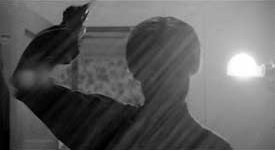 |
| Iconic scene from Hitchcock's Psycho (1960) |
As we cling to the edges of our seats, ready to explode with screams or cower away to forbid our eyes witness the chainsaw about to fall onto victims below, suspense is like a mystery, we are curious of what might happen next. Suspense could give a sense of ambiguity, be prophetic or a come as a surprise, as we do not expect things to be. Many thrillers conjure these feelings by applying techniques such us 'False Plateau' or the 'Bomb-theory' to produce thrilling scenes. For example, Alfred Hitchcock's Psycho's use of the bomb theory slowly builds up tension from scenes of normality (Marion taking a shower) to the shadowy figure waiting behind the shower curtains.



